| Tier 1 countries: First litmus test for the potential of N2Africa |
Under most circumstances, ‘Tier 1’ refers to the most important or the highest priority. In the N2Africa project, Tier 1 countries are those countries in which we started the project in 2009. During the second phase of the project these countries are no longer priority countries, as the project focuses on five ‘Core Countries’. Nevertheless, the ‘Tier 1’ countries are still very important and critical to the project, since they provide the first litmus test for the potential of N2Africa technologies and approaches to continue living and delivering their livelihood impacts without direct donor support.
|
2 |
| Highlights from N2Africa in Rwanda |
|
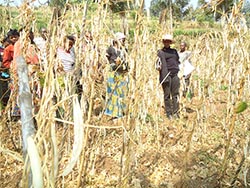
Picture: Participatory evaluation of technologies
|
Rwanda was among the first countries where N2Africa activities started, early at the beginning of the project. Already in February 2010, the first hundred farmers were testing the soyabean technology called “need to inoculate”. Each farmer was hosting four plots, with two plots inoculated and two plots not inoculated. The results confirmed the need to inoculate soyabean. From then, N2Africa dissemination packages of soyabean included inoculants.
At the end of Phase I, more than 20,000 households from five districts of Rwanda had been reached with direct dissemination packages of legumes technologies, precisely soyabean and common bean.
|
|
3 |
| Plant legumes heal the soil in Malawi |
|
Almost all crop types in Malawi suffered in what is seen as one of the worst crop performances of the last 13 years. Aftermaths of El Niño have left a good part of Malawian farmers more destitute, impoverished and worried. Despite the hard times in this planting season, those farmers who planted legume crops have some refuge and have stories to share. ...
|
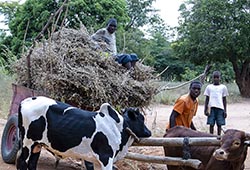
Picture: Farmers like these have experienced high yield with the use of inoculants. ©IITA-Malawi
|
|
4 |
| Testing biological nitrogen fixation of soyabean in partnership with NCBA-CLUSA in Mozambique |
|
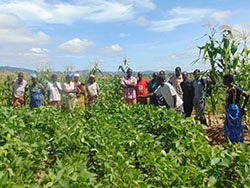
Picture: Field day in Barue District
|
Since the re-introduction of soyabean in Mozambique, the main soyabean inoculant used across the country is the short shelf inoculant MasterFix imported from Brazil. The National Cooperative Business Association (NCBA-CLUSA) is a not-for-profit cooperative development and trade association, and partners with N2Africa in the soyabean value chain. ...
|
|
5 |
| Mid-year 2016 report: Marketing and processing legumes in west Kenya |
| Stimulating marketing and value-added processing of grain legumes is an important activity within the N2Africa Project in west Kenya. During the first six months of 2016 a total 96 tons of soyabean grain were sold through collective marketing by members belonging to the WeRATE R4D Platform in west Kenya, generating KES 5 million. ... |
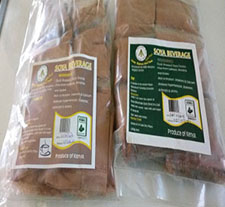
Picture: Soya Beverage is packed in 12 x 20 g economy-sachets
|
|
6 |
| BNF technology clearinghouse event in Kenya |
|
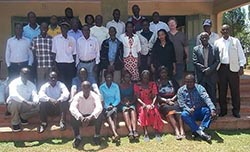
Picture: Participants at the Clearinghouse event
|
WeRATE held a Clearinghouse planning meeting from 5 to 7 September attended by 30 participants drawn from 26 dues paying members, mostly farmer associations (see picture). During the meeting, BNF technologies were discussed and distributed to members, along with the field protocols to test them. ... |
|
7 |
| Harnessing N2Africa’s nurtured talents among lead farmers for cost-effective technology dissemination in Zimbabwe |
| As we move into the last year of active farmer engagement, the research team in Zimbabwe has begun tapping into a large knowledge base that has been built by N2Africa in the last 8 years. Informed by ‘if we do what we have always done, we will get what we have always got’, we recently innovated our dissemination and training approach over the recent post-harvest period (May - October) for our nutrition and marketing initiatives. |
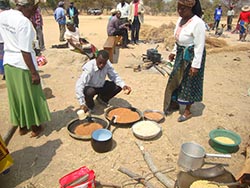
Picture 4. Measuring ingredients for nutritional porridge in Hwedza District
|
|
8 |
| N2Africa website renewed |
|
Recently, the N2Africa website has been migrated to a new version of the content management system Drupal. This was done to improve security and performance. Furthermore, the intranet part of the N2Africa website has been separated from the public part. Therefore, the URL of the intranet part has been changed to: http://intranet.n2africa.org
To a great extent the functionality of the user interface has stayed the same. However please, let us know whenever you encounter problems.
|
|
11 |
| Reports uploaded on the N2Africa website |
|
14 |
| N2Africa in the news |
|
15 |
| Related news |
International Year of Pulses (IYP)
The International Year of Pulses creates a unique moment to showcase research investments that would allow pulse crops to deliver on their full potential as a critical player in the global food system. The 10-Year Research Strategy report will be used to set the future research agenda.
|
|
16 |
| Related newsletters |
We received a number of newsletters:
SUN Movement Newsletter September 2016 (Scaling Up Nutrition);
The IITA Bulletin 31 October – 4 November 2016 (No. 2352);
Soybean Innovation Lab Newsletter October 2016;
CIAT blog on Business of quick cook beans;
CIAT blog on Uganda’s rural women find beans to beat climate;
Technical reports on pulse use and nutrition from around the world (IYP);
Nutritional benefits of pulses (FAO);
Pulses: The Heroes of Nutrition & Agricultural Sustainability (FAO);
Legume Alliance blog - Championing radio... .
|
17 |







